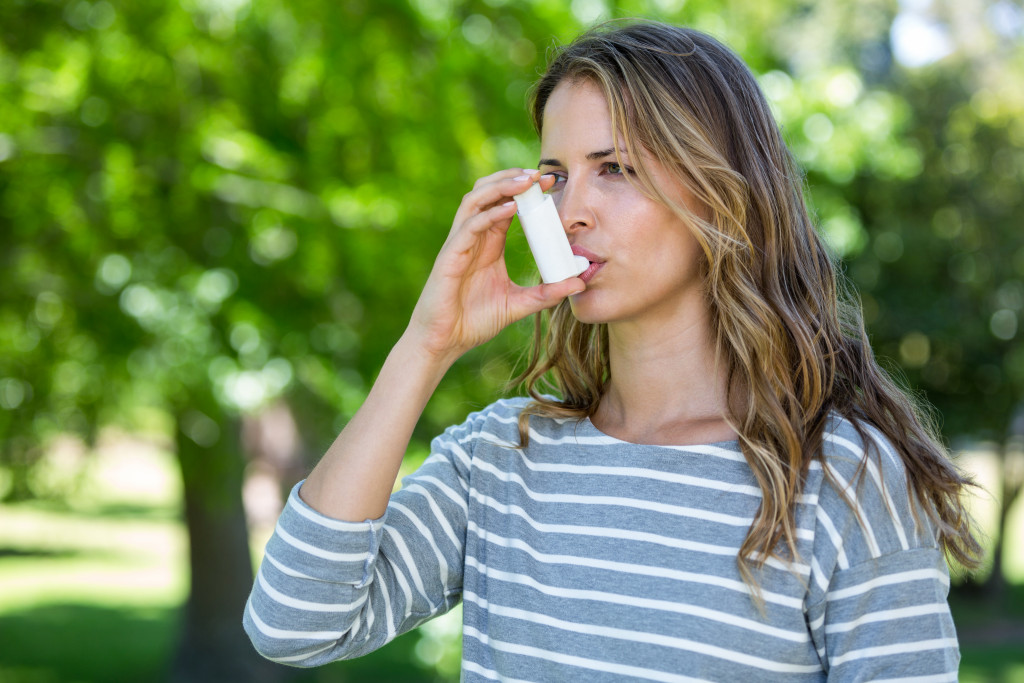The symptoms of allergies and asthma are very similar. Both cause wheezing and coughing, chest tightness, shortness of breath, dizziness or lightheadedness, confusion, and, in severe cases, loss of consciousness.
Both can also be deadly. According to the Asthma and Allergy Foundation of America, about 10 Americans die of asthma each day on average. Meanwhile, severe allergies can lead to anaphylaxis, a life-threatening reaction to allergens.
Moreover, asthma and allergies often occur at the same time.
Almost all kids with childhood asthma (90 percent) also have allergies. In fact, having allergies is a common risk factor for childhood asthma. A family history of both can also increase the risk that a child will develop asthma later on.
Allergy-induced Asthma
The same allergens that trigger an allergic reaction can also lead to an asthma episode in children.
An allergic reaction occurs when the immune system identifies a harmless substance as a dangerous invader and attacks it to protect the body. The symptoms that occur during an allergic reaction, such as nasal congestion, runny nose, red and itchy eyes, and skin rashes, are parts of the immune response that aim to stop the foreign invader from infecting the body. However, the same immune response can also lead to the tightening of the airways, making it difficult to breathe.
Symptoms of asthma and allergic asthma are very similar. Both can cause wheezing, coughing, shortness of breath, rapid breathing, and chest-tightening.
When Pollen Becomes Deadly
Pollen is a common trigger among those who have allergic asthma. And it can be fatal. Any allergen can lead to death if the exposure is extremely high or not get medical intervention quickly.
In the United Kingdom, there was a previous case of a 16-year-old who died of allergic asthma due to exposure to pollen while in a park with friends. His doctors believe that his death was caused by a severe asthma attack. They said that the pollen count was very high on the day he was at the park. It caused his airways to swell and his bronchial tubes to narrow, preventing him from breathing.
Those who have known allergic reactions to common allergens should minimize their exposure. For example, those who experience seasonal allergies caused by pollen should stay indoors whenever the pollen count outdoors is high, which typically occurs in spring and summer.

Moreover, they should take extra precautions. Homeowners should regularly clean their gutters to prevent leaves and other debris, including pollen, from accumulating. A gutter-cleaning service can clear any substance that is building up in your gutter.
Also, close doors and windows when the pollen count is high to prevent the allergens from coming inside the house. Those who have come from outside should immediately remove their clothes and wash their hair and body to remove pollen that might have clung to them.
Other Irritants That Exacerbate Allergic Asthma
Other common allergens include mold spores, animal dander, feces of dust mites, and cockroach feces. But, allergens are not the only ones that can trigger and exacerbate symptoms of allergic asthma.
Exposure to irritants can also lead to an asthma attack, even if they do not cause an allergic reaction. People with allergic asthma should also stay away from smoke, especially from tobacco, air pollution, and cold air.
Most people who have asthma also experience symptoms during and after exercise. It is unclear why it happens, but factors such as cold and dry air, air pollution, and exercises with long periods of deep breathing can increase the risk of triggering an asthma attack. However, they can continue being physically active as long as they take their medications and follow preventive measures.
Treatment for Allergic Asthma
By knowing and avoiding triggers, people can avoid experiencing an allergic asthma attack. However, it is not always possible.
Most medications available in the market treat either allergies or asthma. A few can address both. It is best to consult a doctor to determine the best treatment to reduce symptoms of allergic asthma.
The doctor can prescribe nasal allergy medication, decongestant nasal spray, inhaled steroids, antihistamines, or saline rinses. If these do not work, the doctor might suggest allergy shots and anti-immunoglobulin E (lgE) therapy.
Allergies and asthma go hand in hand. Most people who have asthma also have an allergy. When an allergic reaction happens, asthma can occur, too. People who have both should be aware of their triggers so that they can avoid them.









